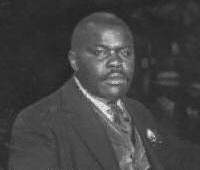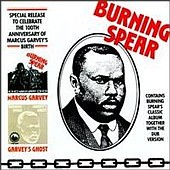Marcus Garvey
 This world-reknowned freedom fighter and
Rasta prophet has fought for the upliftment of the African natives and diaspora
virtually since his inception in St. Anne's Bay, Jamaica on August 17, 1887. This black
nationalist leader was instrumental in and the catalyst for black defiance in
America. Marcus Moziah Garvey founded the Universal Negro Improvement Association in 1916,
which attracted between 2 and 4 million followers. The UNIA stressed black repatriation,
or returning to one's homeland, by encouraging that blacks in the West return to
their roots and settle back in Africa. I have heard that Garvey even contacted
several white supremacist groups in hopes of financing the repatriation of blacks
to Africa, though his request was refused.
This world-reknowned freedom fighter and
Rasta prophet has fought for the upliftment of the African natives and diaspora
virtually since his inception in St. Anne's Bay, Jamaica on August 17, 1887. This black
nationalist leader was instrumental in and the catalyst for black defiance in
America. Marcus Moziah Garvey founded the Universal Negro Improvement Association in 1916,
which attracted between 2 and 4 million followers. The UNIA stressed black repatriation,
or returning to one's homeland, by encouraging that blacks in the West return to
their roots and settle back in Africa. I have heard that Garvey even contacted
several white supremacist groups in hopes of financing the repatriation of blacks
to Africa, though his request was refused.
Garvey also encouraged economic independence
from the white majority as a means of gaining self-respect. "Up you mighty race!"
Garvey would shout as the UNIA's rallying cry to break blacks out of their
complacency. Many of the ideals of the Garveyites would be professed again in the
speeches of the Nation of Islam, the Black Panthers, etc. The teachings of Garvey
were instrumental in shaping the beliefs of Malcolm X, whose preacher father was
a Garveyite. Garvey himself was
convicted in 1925 of mail fraud when trying to get his own business, the Black
Starliner, off of the ground. Many reggae singers profess that the "Black Starliner
must come," believing incorrectly that the steamship transportation company was designed to return
blacks to Africa.
To Rastas, however, Garvey takes on legendary importance. Though many of the beliefs
concerning Garvey are not substantiated by sources, it is a commonly held belief
that before departing Jamaica, Garvey spoke and prophesied of a Black Redeemer
who would come out of Africa. When Haile Selassie
ascended the throne in November of 1930, it was like a dream come true. This is
one main reason for the belief in Selassie's divinity. In fact, the Nyabinghi
regard Marcus as a member of the Holy Trinity.
 Marcus Garvey is primarily responsible for the black pride and black nationalism
that arose during the rise of Rastafari in Jamaica. He is certainly venerated by
all Rastas, and often receives praise in the works of many reggae singers, especially
Burning Spear. On the
100th anniversary of Garvey's birth, Spear released a combination album of his
"Marcus Garvey" and it's dub "Garvey's Ghost," entitling the combination LP
"100th Anniversary" (above). The booklet reads, "Marcus Garvey's struggle against racism
and colonialism have provided a platform for black pride and dignity." Amen.
Marcus Garvey is primarily responsible for the black pride and black nationalism
that arose during the rise of Rastafari in Jamaica. He is certainly venerated by
all Rastas, and often receives praise in the works of many reggae singers, especially
Burning Spear. On the
100th anniversary of Garvey's birth, Spear released a combination album of his
"Marcus Garvey" and it's dub "Garvey's Ghost," entitling the combination LP
"100th Anniversary" (above). The booklet reads, "Marcus Garvey's struggle against racism
and colonialism have provided a platform for black pride and dignity." Amen.
 This world-reknowned freedom fighter and
Rasta prophet has fought for the upliftment of the African natives and diaspora
virtually since his inception in St. Anne's Bay, Jamaica on August 17, 1887. This black
nationalist leader was instrumental in and the catalyst for black defiance in
America. Marcus Moziah Garvey founded the Universal Negro Improvement Association in 1916,
which attracted between 2 and 4 million followers. The UNIA stressed black repatriation,
or returning to one's homeland, by encouraging that blacks in the West return to
their roots and settle back in Africa. I have heard that Garvey even contacted
several white supremacist groups in hopes of financing the repatriation of blacks
to Africa, though his request was refused.
This world-reknowned freedom fighter and
Rasta prophet has fought for the upliftment of the African natives and diaspora
virtually since his inception in St. Anne's Bay, Jamaica on August 17, 1887. This black
nationalist leader was instrumental in and the catalyst for black defiance in
America. Marcus Moziah Garvey founded the Universal Negro Improvement Association in 1916,
which attracted between 2 and 4 million followers. The UNIA stressed black repatriation,
or returning to one's homeland, by encouraging that blacks in the West return to
their roots and settle back in Africa. I have heard that Garvey even contacted
several white supremacist groups in hopes of financing the repatriation of blacks
to Africa, though his request was refused.  Marcus Garvey is primarily responsible for the black pride and black nationalism
that arose during the rise of Rastafari in Jamaica. He is certainly venerated by
all Rastas, and often receives praise in the works of many reggae singers, especially
Burning Spear. On the
100th anniversary of Garvey's birth, Spear released a combination album of his
"Marcus Garvey" and it's dub "Garvey's Ghost," entitling the combination LP
"100th Anniversary" (above). The booklet reads, "Marcus Garvey's struggle against racism
and colonialism have provided a platform for black pride and dignity." Amen.
Marcus Garvey is primarily responsible for the black pride and black nationalism
that arose during the rise of Rastafari in Jamaica. He is certainly venerated by
all Rastas, and often receives praise in the works of many reggae singers, especially
Burning Spear. On the
100th anniversary of Garvey's birth, Spear released a combination album of his
"Marcus Garvey" and it's dub "Garvey's Ghost," entitling the combination LP
"100th Anniversary" (above). The booklet reads, "Marcus Garvey's struggle against racism
and colonialism have provided a platform for black pride and dignity." Amen.